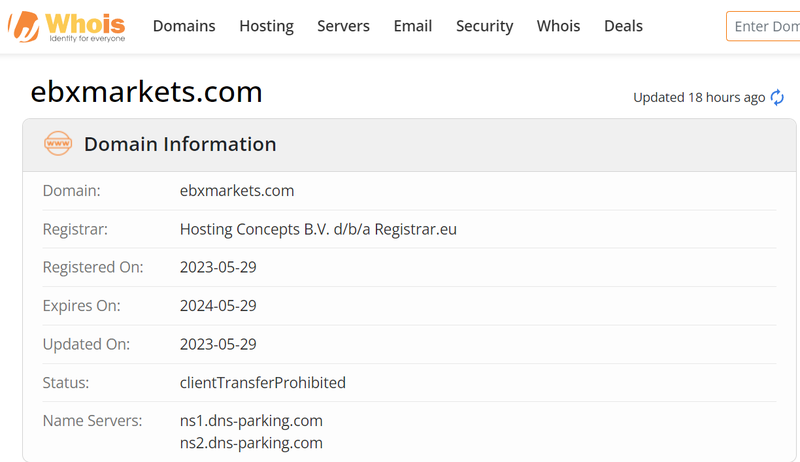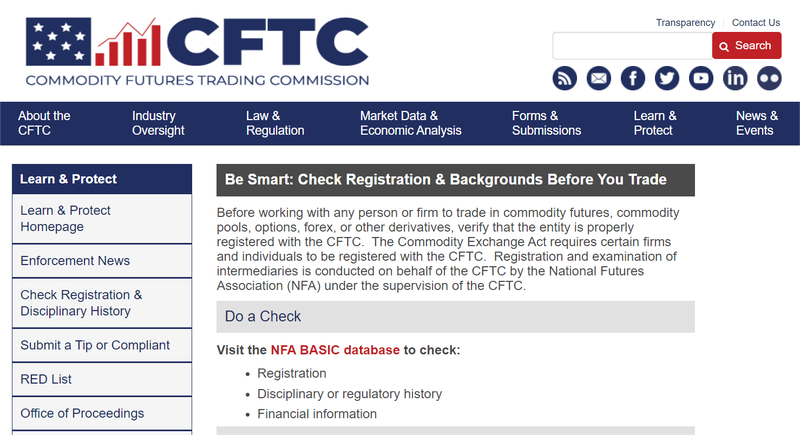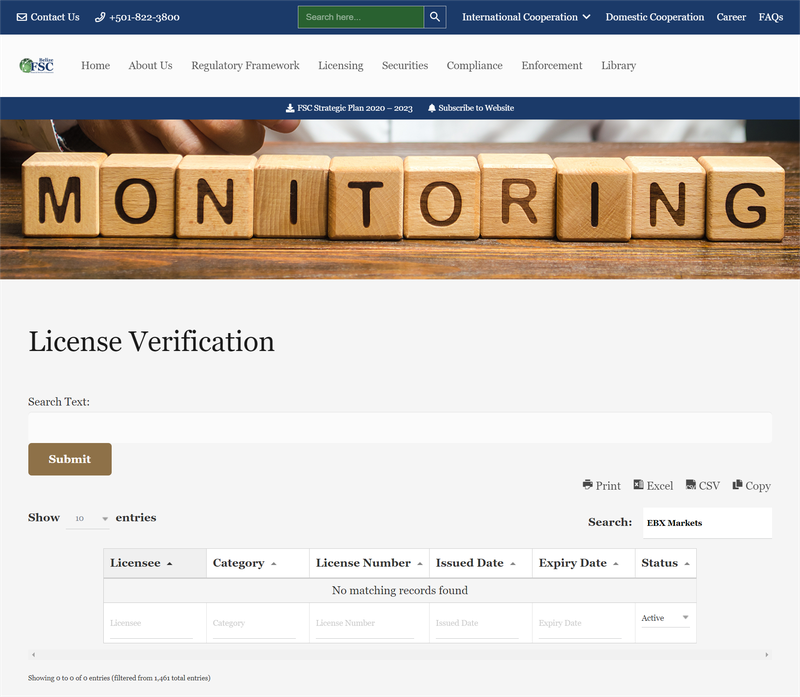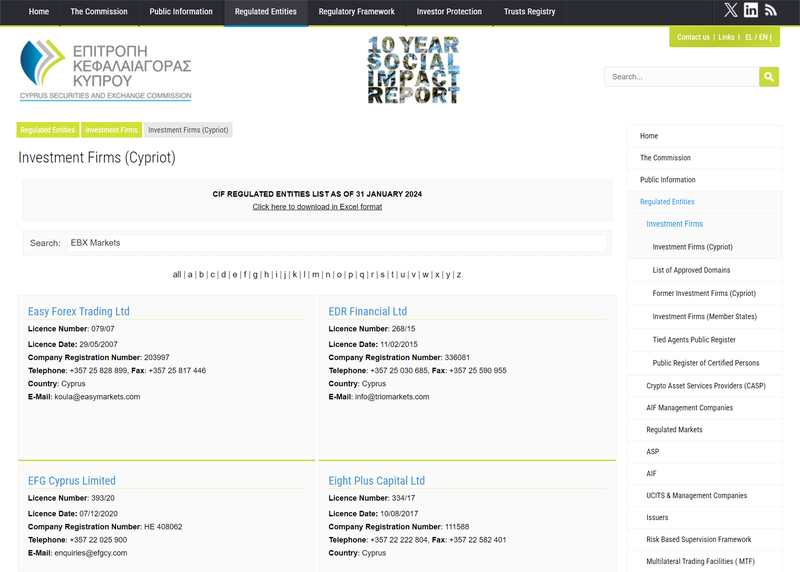EBX Markets surfaced as a forex broker on May 29, 2023, offering trading services across various markets including forex, commodities, indices, bonds, cryptocurrencies, stocks, and futures. It operates through popular trading platforms like MetaTrader 4 (MT4), MetaTrader 5 (MT5), and cTrader, catering to a diverse range of traders. However, despite its apparent offerings and market reach, several aspects of EBX Markets’ business operations and regulatory claims raise concerns about its legitimacy. This article delves into EBX Markets’ registration details, regulatory status, and other critical information to help potential investors make an informed decision.

1. Background and Business Scope of EBX Markets
EBX Markets claims to provide access to a broad spectrum of trading markets, with the flexibility of utilizing popular trading platforms such as MT4, MT5, and cTrader. It presents itself as a global trading entity but explicitly mentions that it does not offer services in certain countries, including the United States, Canada, Israel, New Zealand, Japan, and Iran.
1.1. Markets and Services Offered
- Forex Trading: Provides various currency pairs for forex trading, including majors, minors, and exotics, aiming to attract both novice and experienced traders.
- Commodities: Offers trading in commodities like gold, silver, crude oil, and natural gas.
- Indices and Bonds: Claims to provide access to leading global stock indices and government bonds for diversified investment opportunities.
- Cryptocurrencies: Lists cryptocurrencies such as Bitcoin, Ethereum, and other digital assets for trading.
- Stocks and Futures: Allows trading in global stock markets and futures contracts, appealing to investors seeking diverse asset classes.
Despite the range of services offered, EBX Markets’ legitimacy comes into question due to inconsistencies in its registration and regulatory claims.
2. Registration Information and Regulatory Claims of EBX Markets
2.1. Claimed Registration and Headquarters
EBX Markets’ official website lists its headquarters in Sydney, Australia, under the registered entity name “International Capital Markets Pty Ltd” with an Australian Company Number (ACN) of 123 289 109. According to the information provided, this entity is authorized and regulated by the Australian Securities and Investments Commission (ASIC) with a license number of 335 692. The broker also claims regulation by multiple international authorities, including:
- Commodity Futures Trading Commission (CFTC) – USA

- Belize International Financial Services Commission (IFSC)

- Cyprus Securities and Exchange Commission (CySEC)

Moreover, the website states that another entity, “IC TRADE MARKET,” operates under the same regulatory licenses and is headquartered in New York. This tangled web of claims raises immediate red flags for discerning investors.
2.2. Uncovering the Truth: False Regulatory Claims
Upon verification, it becomes evident that “International Capital Markets Pty Ltd” is indeed the legal entity behind “IC Markets,” a well-known and regulated broker in Australia. However, IC Markets and EBX Markets have no relation whatsoever.
Similarly, “IC TRADE MARKET” is associated with “IC Markets,” not EBX Markets. This means that EBX Markets has falsely associated itself with a legitimately regulated entity to create a facade of compliance and trustworthiness. Such misleading claims indicate that EBX Markets is neither regulated by ASIC, CFTC, IFSC, nor CySEC, contradicting the information presented on its website.
3. Risks Associated with False Regulatory Claims
A broker that falsely claims to be regulated poses significant risks to investors. Regulation is a crucial safeguard that protects investors’ interests, ensures fair trading practices, and mandates the segregation of client funds from the broker’s operating capital. Here are some of the key risks associated with unregulated brokers like EBX Markets:
3.1. Misappropriation of Client Funds
Regulated brokers must adhere to strict rules about the handling and segregation of client funds. In contrast, unregulated brokers often do not follow these guidelines, making it easier for them to misuse or misappropriate investor funds. This often leads to situations where clients are unable to withdraw their funds, as the broker may have misused the money for its own purposes.
3.2. Manipulative Trading Practices
Unregulated brokers are not subject to oversight concerning their trading practices. This means they can manipulate trading platforms by altering prices, causing abnormal slippage, and executing trades unfairly to the broker’s benefit. Clients might encounter situations where trades are unfairly closed or where the trading platform malfunctions at critical moments, resulting in losses for the trader.
3.3. Lack of Legal Recourse
Regulated brokers offer channels for dispute resolution, allowing clients to lodge complaints with regulatory authorities if issues arise. In contrast, unregulated brokers like EBX Markets leave investors without legal recourse, as no regulatory body oversees their activities or enforces compliance.
4. Real-Life Examples: The Dangers of Unregulated Brokers
Case 1: Broker Impersonation and Scam
In a case similar to EBX Markets, an unregulated broker falsely claimed association with a well-known regulated entity to attract clients. The broker used a similar name, logo, and even copied some of the content from the legitimate broker’s website. Investors, misled by the false regulatory claims, deposited large sums of money. Over time, the broker started restricting withdrawals, citing various technical issues. Eventually, the broker disappeared, taking with it the investors’ funds. Attempts to recover the money failed because the broker was unregulated and operated from an undisclosed location.
Case 2: Price Manipulation and Denial of Withdrawals
Another unregulated broker operating under false pretenses manipulated its trading platform to cause unnatural price spikes and slippage, resulting in client losses. When traders tried to withdraw their remaining funds, the broker delayed or denied the requests, using vague terms and conditions as an excuse. Without regulatory oversight, investors had no means of appealing these unfair practices and ultimately lost their investments.
5. The Importance of Regulation in Forex Trading
The role of regulation in the financial markets is to ensure a fair, transparent, and secure trading environment for all participants. Regulatory bodies such as ASIC, CFTC, IFSC, and CySEC impose strict standards on brokers to:
- Protect Client Funds: Requires brokers to keep client funds in segregated accounts, separate from the broker’s operating capital.
- Ensure Market Integrity: Enforce fair trading practices and prevent brokers from manipulating market prices to their advantage.
- Mandate Transparency: Require brokers to disclose important information about their operations, fees, and risks involved in trading.
- Offer Legal Recourse: Provide investors with a channel to resolve disputes and seek compensation in case of misconduct.
EBX Markets’ false claims of regulation by ASIC, CFTC, IFSC, and CySEC clearly show a lack of transparency and disregard for the principles of fair trading, highlighting the potential dangers for investors.
6. How to Verify a Broker’s Legitimacy
To safeguard against fraudulent brokers, investors should take the following steps to verify the legitimacy of a broker:
- Check the Official Regulatory Website: Search for the broker’s name and license number on the official website of the claimed regulator (e.g., ASIC, CFTC, IFSC, CySEC). Legitimate brokers will have their registration details publicly listed.
- Review Company Registration Information: Visit the official company registry (e.g., Australian Securities and Investments Commission for Australian companies) to verify the broker’s registered entity and address.
- Inspect the Website for Red Flags: Look for inconsistencies on the broker’s website, such as contradictory information about headquarters, registration details, or regulatory claims.
- Seek Independent Reviews: Use financial forums, professional review sites, and social media to gauge other investors’ experiences with the broker.
- Test Customer Support: Contact the broker’s customer support to gauge their responsiveness and professionalism. Legitimate brokers usually provide timely and knowledgeable support.
7. Is EBX Markets Trustworthy?
Given the discrepancies in EBX Markets’ claims and the false association with regulated entities, it is evident that EBX Markets is not a trustworthy broker. Investors should be cautious and avoid brokers that use misleading tactics to feign legitimacy. Selecting a broker with a genuine regulatory license, verified by a reputable regulatory authority, is the most reliable way to ensure fund security and a fair trading environment.
8. Frequently Asked Questions (FAQ)
1. Is EBX Markets regulated by ASIC?
No, EBX Markets is not regulated by ASIC. The company claims to be registered under International Capital Markets Pty Ltd, which is actually the legal entity behind IC Markets. EBX Markets has no affiliation with IC Markets or ASIC.
2. How can I verify a broker’s regulatory status?
Visit the official website of the regulator (e.g., ASIC, CFTC, IFSC, CySEC) and use the broker’s name or registration number to search for their license information. Always ensure the information matches the details provided on the broker’s website.
3. What are the risks of trading with an unregulated broker?
Trading with an unregulated broker can lead to fund misappropriation, manipulated trading conditions, price manipulation, denial of withdrawals, and a lack of legal recourse in the event of disputes or fraud.
4. What trading services does EBX Markets claim to provide?
EBX Markets claims to offer forex, commodities, indices, bonds, cryptocurrencies, stocks, and futures trading through platforms like MT4, MT5, and cTrader.
5. Why is broker regulation important?
Regulation ensures that brokers operate transparently, fairly, and securely. It mandates the segregation of client funds, enforces market integrity, and provides investors with a means of recourse in case of disputes or fraudulent activities.
6. What should I do if I suspect a broker is operating illegally?
If you suspect a broker is operating illegally, report them to the relevant regulatory authorities. You can also warn other investors by posting reviews on financial forums and reporting the broker to consumer protection organizations.



